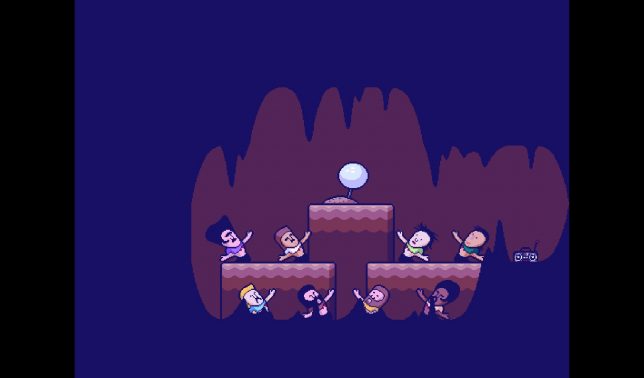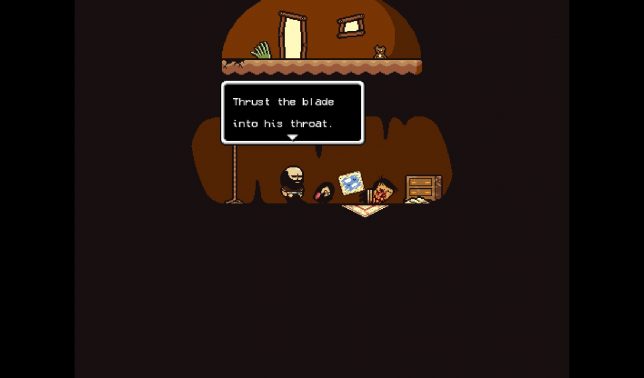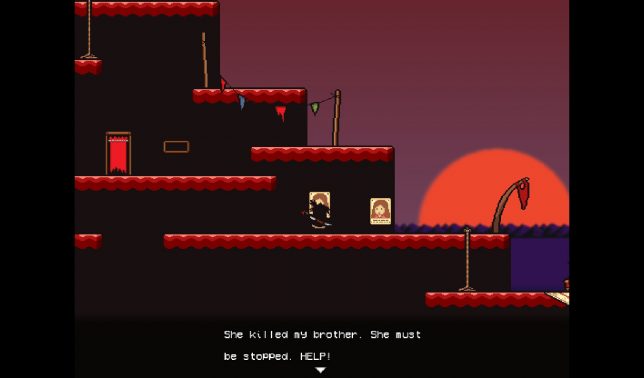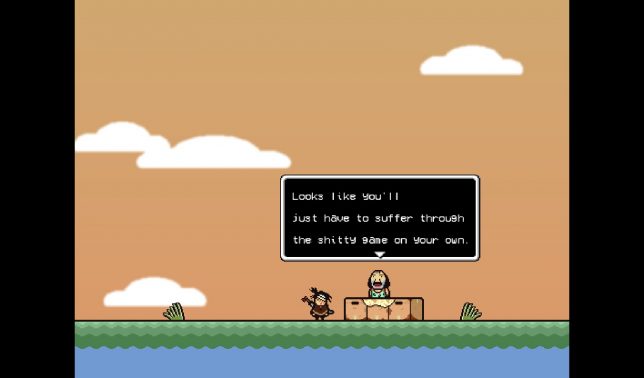It’s the end of the road; after fighting, getting kidnapped, and eventually having your face mutilated, the maniac that pursues you approaches. Arms cut off, eyes gouged, arrows, bullet wounds, burns—nothing can stop him. Your father (though he doesn’t like being called that), Brad Armstrong, one of the most powerful men in the world, approaches after having defeated an entire army. “Did I do the right thing?” he asks tearfully, as he collapses before you. Regardless of your answer, he won’t be saved—you won’t be saved. Now your journey starts as you and your only friend, former warlord Rando, head off to defeat the other warlords of Olathe. You are Buddy Armstrong, and you will be nobody’s prisoner, nobody’s victim anymore.

No joy is to be found, though there shall always be Joy.
LISA: The Joyful is the last entry in the LISA series, taking place immediately after LISA: The Painful ends. You play as Buddy Armstrong, adopted daughter of Brad, as she fights the warlords of Olathe to bring meaning and value to her life. Like the game it expands upon, LISA: The Joyful is a sidescrolling, menu-based RPG built in RPG Maker. Using pretty much all of the assets from LISA: The Painful, it exhibits the same graphical and musical charm as its predecessor. It would be misleading to describe it as “More of the Same”, though; while it is the same gameplay and graphics engine, the story somehow takes it to the next level. Alongside surprising difficulty and atmospheric escalation, we’ve got a game that goes above and beyond the bar set by its predecessor.
Combat is still similar, but a different narrative, and Buddy’s new skillset, force a different perspective on battles.
LISA: The Joyful carries the same gameplay as LISA: The Painful, with menu -based RPG combat and 2D exploration. Combat has you mixing status effects with character attacks, once again allowing bosses to be debilitated by common debuffs, and Buddy’s unique “Precision Attacks”. When using Buddy’s skills, you need to line up a shrinking circle with a static circle as close as possible to maximize damage and apply status effects; the game counts on this and punishes you if you do not. Healing items are more scarce than in LISA: The Painful, enemies hurt more, allies are less plentiful, and character upgrades are less frequent. While the base elements are similar, your knowledge of them are put to the test in a more difficult experience.

While the music is not dead, RIP in peace Widdly2Diddly.
The graphics and music also remain much the same. We have 2D graphics unlike anything RPG Maker provided (save LISA: The Painful), presented in a way that RPG Maker games rarely provide. The music is often atmospheric, well crafted, and occasionally surreal and disturbing. It all takes a darker turn in LISA: The Joyful, however, due to story reasons. There are darker colors and fewer visual jokes and cheerful music tracks. This, in turn, does a good job of capturing the overall mood of LISA: The Joyful…that everything is getting worse and nothing gets better.

Pictured above: the cycle of abuse.
The story is the darkest, most compelling point of LISA: The Joyful. Where LISA: The Painful had hope and sacrifice as major themes, LISA: The Joyful‘s major themes are freedom and anger. Following Buddy as she conquers Olathe is distressing, seeing how she was hurt by everyone around her, and how that pain will end up destroying everyone she meets. It’s a story fitting to end the tragedy of the LISA series—until you reach the final scene. The blame for the state of Brad, Buzzo, and Buddy is shifted upon the titular character, Lisa Armstrong, dead from suicide brought on by the abuse she faced as a child. It’s awful, without warning, and downright wrong to place the blame solely upon a victim of abuse instead of, perhaps, her abuser. Despite this major flaw in the story, it is still an excellent tragedy, though not for the squeamish or soft of heart.
It’s all about the feelings a game inspires, but even then at the end of the day? Sometimes, it’s still a middle finger.
So, representation is an ugly ball with this game series. For race and bodies, it still features an astounding amount of variety. Through strange phrasing, it sounds like one character is implying he’s transgender. My big issue is how the game ultimately ends up representing a victim of abuse and her accountability for the events that followed in the wake of her abuse. While it accounts that victims of abuse can in turn become abusers, this point is also made with other characters. The unfortunate part is that, not only does the game’s creator consider her the worst character in the game, but eventually the narrative also shifts full responsibility for the state of several key characters onto Lisa. While unreliable narrator is a thing to consider, as well as the fact that abuse victims can themselves abuse other people, to paint one as the worst character and sole cause of all the misery in the game is a little messed up.

Even this short chapter features significant character development.
Honestly, though, LISA: The Joyful is a strong game and evokes powerful emotions. Where The Painful features saving innocence as a major theme, The Joyful’s defining theme seems to be a young girl’s right to decide the course of her life. The two games create an interesting narrative of a father seeking to protect his daughter, and a daughter looking to break free from her father’s shadow and create her own life. Combined with the horrible lives both characters lived, I would have to say that if you played LISA: The Painful you should definitely play LISA: The Joyful. If you enjoy tragic stories, adult themes, and wacky humor, pick both games up. I cannot recommend LISA: The Joyful on its own, though, as it requires LISA: The Painful so much to establish familiarity with the characters and the world. However, together, they’re dark indie games which tell a gut-wrenching story of some very adult fears and emotions.










You probably are the only person on the internet who observed victim blaming in the game. Cause if it wasn’t then the creator wouldn’t have called Lisa the worst character or at least the narration would have blamed or called the game “Marty”, suggesting him as the centralized root cause of suffering of all the other characters.
But then again it’s a “game” and dealing with ethics or realism in characters doesn’t seem to be dingaling’s aim. It certainly evoked strong emotions of hopelessness in perverse dark humour and less of empathy.
While considering the game as a work of art it reflects beautifully at the part of our real society that is majorly flawed and resort to blaming victim for its own self preservance. As if it’s a collective psychological fear of dissonance that bad things can’t happen to good people and normal people can do bad things as well. Accepting which, can lead to face the reality of absence of order which is previously distorted by having faith in order and justice that everyone pays for what they do.
Hence like the society the creator of the game resorted to blaming Lisa in order to continue feeling safe for himself that it can never happen to him building the trilogy of this monstrous revenge loop of revictimization.
…..
Overall loved the gameplay with pretty good tracks and wrestling moves so i guess victim blamings excused…now thats what makes the game truly messed up.
Okay, but even without saying “Lisa is a horrible person who deserved everything that came to her” we could still have Lisa existing at the center of events. Her suicide drove Brad into Joy addiction, Bernard to mutilate Dusty, and Marty to redeem himself. Of these things, the former two have the most impact on the plot. Marty’s abuse did turn Lisa into a horrifying, cold person, and if she grew up she absolutely would be as terrifying as any villain in LISA, Joyful or Painful, but that doesn’t mean Lisa deserved what Marty did to her. Either way, I make that statement because I believe people should know that ahead of time the game believes a victim of childhood abuse and rape is responsible for everything that catalyzed the plot of the game, which includes her own rape and abuse.
But you make a good point! This is how society does frame these things, and from a perspective of commentary it’s very cutting considering that we as players know the full story, while the final protagonist, Buddy, doesn’t.
And, ultimately? I do think the game is good, my complaint regarding victim blaming comes from the angle of warning people, as well as that I can enjoy problematic things so long as I know why they’re problematic and don’t try to sugar coat it or dismiss it.
Thank you for your comment!
That does make sense.
The creator calling LISA the worst character without legit explaination is also where problem lies. Since clearly the narration enables player to empathize with Brad’s struggle with abuse and joy, or even Buddy for that matter but that doesn’t seem to be the case with Lisa ( Probably because of lack of voice in game narration, made her character seem a bit hollow and unrealistic even for a mentally unstable person. )
Now that makes me think if a victim of abuse actually plays this game how would that victim blaming really make them feel. Yikes! Hope the warning and mature rating really works. Or maybe some joy.
Anyway you did a pretty good analysis. I am glad someone was able to look deeper atleast.
Lisa did get a game to herself allowing for the player to emphasize with her, unfortunately it is not of anywhere near a similar style or tone as LISA: The Painful or LISA: The Joyful. LISA the First seems to be a puzzle game set inside Lisa Armstrong’s mindscape and the squalid house she lives in with Marty and Brad. It discusses the sexual and physical abuse she endures at the hands of her father, and her attempts to work up the willpower to escape the house before he comes home. I cannot play or watch the game because of this subject matter, so I only know what I’ve read from synopses. One of the last lines of dialogue in the game is Marty telling Lisa, “Don’t try to escape this, just accept that this is your life from now on and there’s nothing better waiting for you in this world.”
On top of this, at the end of Joyful it’s possible to see some dialog windows alluding to the horror Lisa went through, as well as her mindset. One with the implication that Marty forced Brad to join in on the abuse, and the other that she had her face mutilated by Bernard, probably in a way similar to Rando’s mutilation, in an effort to prevent Marty from finding her attractive enough to sexually abuse. This unfortunately doesn’t seem to work, as sexual abuse is never about how attractive a person is.
I feel we’re given the chance to empathize with Lisa, but only in a prequel that people who enjoyed these games would not enjoy either due to different game play or a complete tonal shift. Either that or two post game dialog boxes that are only available if certain choices are taken. To be honest? We shouldn’t need much to empathize with a victim of child abuse.